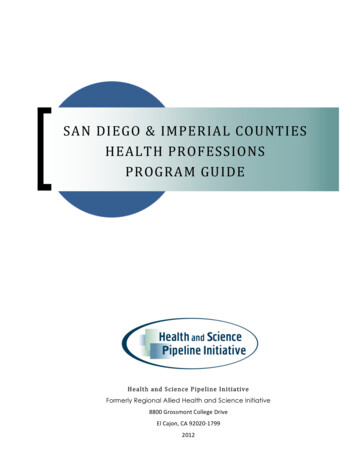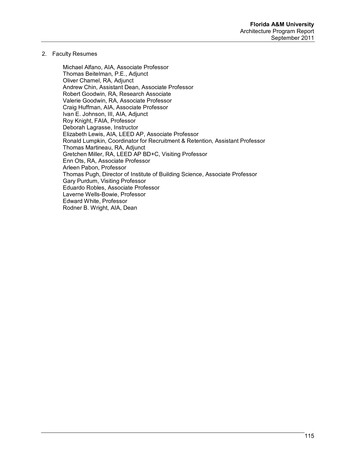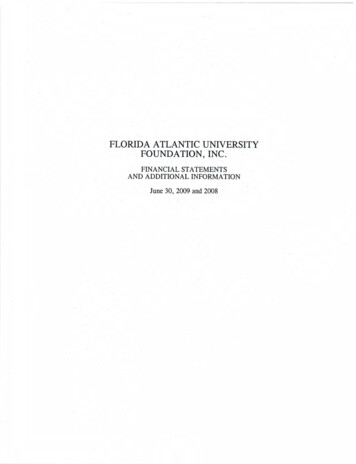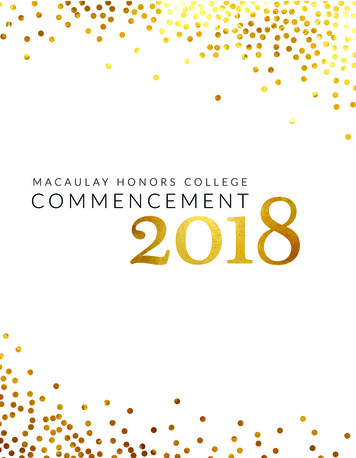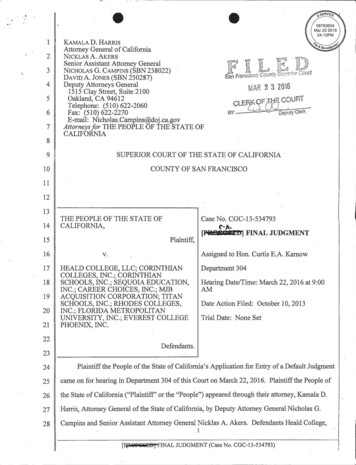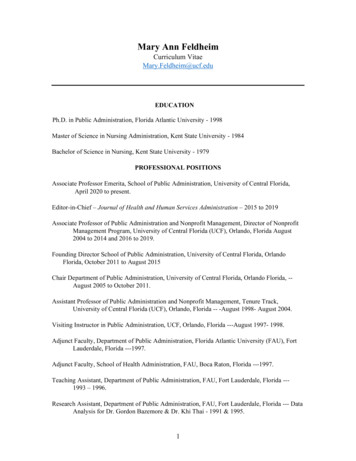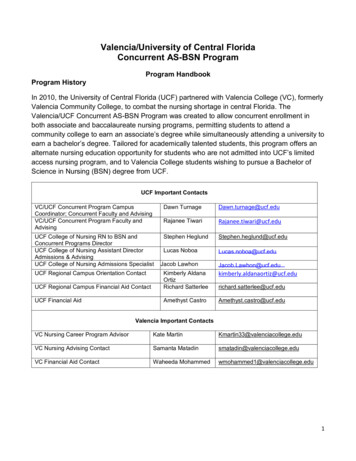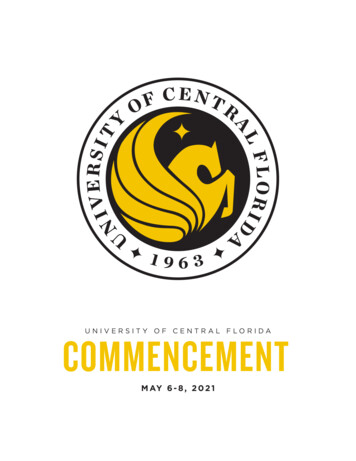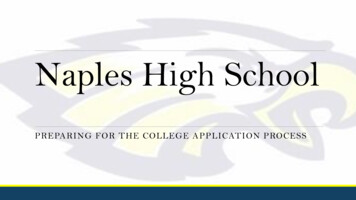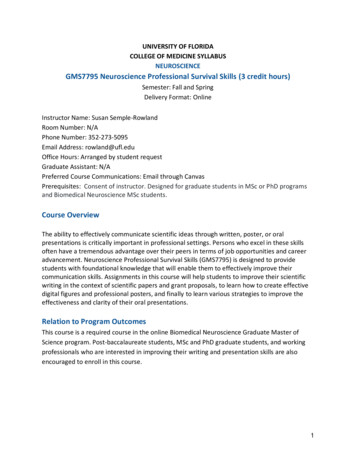
Transcription
UNIVERSITY OF FLORIDACOLLEGE OF MEDICINE SYLLABUSNEUROSCIENCEGMS7795 Neuroscience Professional Survival Skills (3 credit hours)Semester: Fall and SpringDelivery Format: OnlineInstructor Name: Susan Semple-RowlandRoom Number: N/APhone Number: 352-273-5095Email Address: rowland@ufl.eduOffice Hours: Arranged by student requestGraduate Assistant: N/APreferred Course Communications: Email through CanvasPrerequisites: Consent of instructor. Designed for graduate students in MSc or PhD programsand Biomedical Neuroscience MSc students.Course OverviewThe ability to effectively communicate scientific ideas through written, poster, or oralpresentations is critically important in professional settings. Persons who excel in these skillsoften have a tremendous advantage over their peers in terms of job opportunities and careeradvancement. Neuroscience Professional Survival Skills (GMS7795) is designed to providestudents with foundational knowledge that will enable them to effectively improve theircommunication skills. Assignments in this course will help students to improve their scientificwriting in the context of scientific papers and grant proposals, to learn how to create effectivedigital figures and professional posters, and finally to learn various strategies to improve theeffectiveness and clarity of their oral presentations.Relation to Program OutcomesThis course is a required course in the online Biomedical Neuroscience Graduate Master ofScience program. Post-baccalaureate students, MSc and PhD graduate students, and workingprofessionals who are interested in improving their writing and presentation skills are alsoencouraged to enroll in this course.1
Course Objectives and GoalsThe primary learning objectives for this course are listed below. Each learning module has beenstructured to help you successfully complete these objectives. Upon completing this course youwill be able to: Describe how individuals read scientific documents and what their expectations areDescribe the importance of word selection and how word use affects writing clarityRecognize and write logically cohesive passagesCreate "publication ready" digital scientific figuresDescribe the similarities between research papers and research proposalsCreate and deliver effective poster and oral presentationsInstructional MethodsThis is an online asynchronous course that has been created using CANVAS, an online coursemanagement system. The course is divided into 12 modules. Most modules are designed to becompleted over the course of one week – modules 9-11 will each be completed over the courseof two weeks.To enable students to get the most out of this course, I have integrated several onlinecommunication tools into this course that should make it easier to actively engage in thecreative processes of writing and digital media creation. In this course, all lectures and someassignments will involve use of VoiceThread, an asynchronous learning platform. Writing andmedia creation assignments will be submitted, peer-reviewed, and discussed within the Canvascourse platform.The textbook Scientific Writing and Communication - Papers, Proposals, and Presentations, 4thEdition, by Angelika H. Hofmann, Oxford University Press is required for this course. This bookis available as a paperback or eTextbook and is worth purchasing because (1) each modulecontains a reading assignment taken from this textbook and (2) the book will serve as anexcellent reference text for you once the course is completed. When appropriate, I havesupplemented the assigned textbook chapters with specific papers.Student assessments include short writing assignments (7 total) designed to reinforce themodule materials, tests to insure concepts are understood (3 total), critiques of manuscriptfigures and posters (2 total) and creation of a short oral presentation using VoiceThread.How to Succeed in this Online CourseFirst, you need to be aware that online learning poses its own unique challenges. Because theonline classroom is available to you 24 hours a day it is easy to delay work on course material,forget deadlines, and not put enough time into course work to perform well on exams and2
assignments. These challenges can be exacerbated when students are not 'self-starters' or donot possess good time management skills.Unlike traditional instructional settings in which each student goes to the same class, the onlinesetting enables every student to “create” the class of his or her choosing. In theory, this type ofinstruction should be more adaptable to a variety of learning styles; however, the reality is thatsome students have not yet determined what their optimal learning style is.Poor performance in online courses often can be directly linked to procrastination and poortime management (trying to do a week’s worth of work just before the deadline). Rushing tocomplete and submit assignments at literally the last minute is NOT a good strategy becauseyou (1) forfeit your opportunity to ask questions about materials you may not understand and(2) it is very easy to miss your opportunity to submit your assignments. In general, I always tryto answer questions you have about course content within 12-24 hrs of your posting of yourquestion. Oftentimes, I answer much more quickly. Your questions are important to me andconstitute a very important part of the teacher/student interaction. Waiting until the day orhour an assignment is due does not allow me to provide you with the educational support that Iwould like to provide since I may not be able to answer your questions before an assignment isdue.You are expected to adhere to the posted assignment deadlines; however, you are encouragedto complete module assignments before they are due if this is convenient for you. It is possibleto request an assignment deadline extension, but requests must be submitted to me andapproved prior to the deadline if possible.Description of Course ContentCOURSE TOPICSThis is a 14-week course is offered during the Fall and Spring terms. The course is divided into11 modules that will be completed every week. The exception is modules 9-11 that will becompleted over the course of 2 weeks. The following table shows the module topics that wewill cover in this course and the number of weeks that will be spent on each module.Week(s)1123456TopicsCourse IntroductionMod 1 – Understanding Expectations of ReadersMod 2 – Word Selection and Writing ClarityMod 3 – From Sentences to ParagraphsMod 4 – Scientific Manuscripts: The IntroductionMod 5 – Scientific Manuscripts: Materials and MethodsMod 6 – Scientific Manuscripts: Results and Discussion3
789-1011-1213-14Mod 7 – Scientific Manuscripts: AbstractsMod 8 – Preparation of Publishable Digital Figures and Figure LegendsMod 9 – Research ProposalsMod 10 – Poster PresentationsMod 11 – Oral PresentationsCourse Materials and TechnologyReading MaterialsThe following textbook is required for this course Scientific Writing and Communication - Papers, Proposals, and Presentations (4thEdition) by Angelika H. Hofmann. Oxford University Press. This book is available as apaperback and eTextbook.All modules include assigned reading assignments from this text. I have selected this textbecause it should also serve as valuable reference text to you.Required Technology Laptop or desktop computer equipped with microphone and video camera. Themicrophone and video camera can be used to post comments/questions to VoiceThreadlectures and will be used to create the VoiceThread project for Module 11. There areVoiceThread apps that are available for free for iOS and Android devices that can beused to view the VT and comment on them. These apps should not be used whencreating VoiceThreads. For these, I strongly recommend that you use a laptop ordesktop computer. High speed, broad band internet connection such as DSL or cable. A broadbandInternet connection is strongly recommended. Slower connections may affect yourability to interact with materials in the course. It is also recommended that you try tosubmit course exams and assignments well ahead of the deadline since we have foundthat network speeds can significantly slow as the deadlines in online courses approachdue to increased use.SPECIAL NOTE: Some users with satellite Internet service may find their online coursesdo not load quickly or consistently due to satellite network design issues. Installation of LockDown Browser on computer that you will use for this course. Alltests will be taken using LockDown Browser. The computer you use to take exams4
should be “hard wired” to the internet. WiFi is not stable enough to support a reliableconnection for taking tests. Instructions on how to install LockDown Browser areincluded in the course introduction module. Canvas courses are best viewed using Chrome or Firefox. For specific questions aboutbrowser compatibilities and general questions about e-learning at UF please go r any technical issues you encounter with your course please contact the UF computing HelpDesk at 352-392-4357. For Help Desk hours visit: http://helpdesk.ufl.edu/ .Academic Assignments and Grading Readings are assigned from the required textbook (see course materials above) and insome instances, published primary literature.VoiceThread lectures are accessible through the course website. Students areencouraged to post any questions they have about the lecture material directly withinthe lectures using the text, audio, or video audio commenting features ofVoiceThread. These questions will only be visible to the instructor. All questions will beanswered by the instructor. The answers to questions that would benefit all studentstaking the course will be posted in the lecture so all students can view them.Module tests have been designed to reinforce the lecture and reading assignments. Alltests will be taken using LockDown browser and specific directions for taking andviewing the results of these tests accompany each test. Pay particular attention to whenthe results of your test will be visible to you.Written assignments and assigned peer reviews will be submitted through the Canvascourse platform.Online, scheduled synchronous meetings between students and the instructor will beavailable by request throughout the semester using Zoom Conferences.MODULE TESTSModules 1-3 include module tests that will be taken using LockDown browser. The Moduletests consist of T/F, multiple choice, matching, fill-in-the-blank, and multiple answer, and shortessay questions.These tests are timed and the questions will be randomized. Importantly, the time limit forcompleting the exam starts when you start the exam. If you begin a 40 min exam 20 minutesbefore it is due (e.g. 11:59 pm), you will have only 20 min to complete the exam becauseLockdown browser will automatically submit your exam when it is due.5
You will receive your score for the test when you submit it but your score will not contain theresults for any short written answer questions in the test. You will not receive your final scorefor the module tests that include short written answer questions until I grade them. I will postthe corrected test results within 24 hours of the due date/time. You will then be given 24 hoursto view each test and you will be able to see correct/incorrect answers and the comments Ipost on your tests.I strongly recommend that you take the ALL online tests well before the time they are duewhich is 11:59 pm. The speed of the internet can significantly decrease between 10 pm andmidnight and can be particularly problematic during times when there is a dramatic increasein online instruction. Thus, to avoid time delays during testing, you should try to completeexams during non-peak hours and of course avoid using Wifi connections.WRITTEN ASSIGNMENTSStudent will complete seven assignments that involve writing and/or written critiques ofwritten material and two peer reviews. These assignments are accompanied by grading rubricsthat will provide you with guidelines about how your assignments will be evaluated.ORAL PRESENTATIONStudents will create a short oral presentation (5 min) using VoiceThread in Module 11. Thesepresentations will be shared with the class and each student will be assigned one presentationto peer review. Projects and peer reviews will be graded using rubrics provided with theassignments.GRADINGThe percent of the total points possible for this course (497 points) that you earn from thethree module tests (95 points possible), the eight writing assignments (316 points possible), thetwo peer reviews (36 points possible), and the oral presentation (50 points possible) willdetermine your final grade for this course.Module tests will be graded automatically except for any short answer questions which will begraded by me. Grading rubrics will be used to evaluate writing assignments, peer reviews, andthe oral presentation. You will be given the rubrics ahead of time so that you will understandwhat is required to successfully complete these assignments and projects and how they will beevaluated.Students are expected to complete all assignments by the deadlines found in the online coursesyllabus. Students should carefully examine the auto-generated Canvas course syllabus that liststhe specific assignments associated with each module and the dates/times that theseassignments are due. It is important to make a note of due dates for the various quizzes,tests, and assignments since they vary across modules.6
There will be no deadline extensions for completion of a module unless an extension isrequested by the student and granted by me (see Exam/Assignment Policy below). Failure tosubmit a module assignment, quiz, test, or the final project by the course deadline will berecorded as a zero if no extension was granted.Course Assignment Point DistributionAssignment typeModule Tests (3)Writing Assignments (8)Peer Reviews (2)Oral Presentation (1)Points Availabe953163650Total Points 497GRADING SCALEPercentage total Letter Grade Grade Pointspoints earned93-100A4.090-92A-3.6787-89B 3.3383-86B3.080-82B-2.6777-79C 2.3373-76C2.070-72C-1.6767-69D 1.3363-66D1.060-62D-0.67Below 60E0.07
Please be aware that a C- is not an acceptable grade for graduate students. If you obtain a C- ina course, it may be possible for you to retake the course but your C- will remain part of yourcalculated cumulative GPA. If you are enrolled in either the Biomedical Neuroscience Certificateor MSc programs you must have a cumulative final GPA of 3.00 or higher.Additional information on UF grading policy may be found at:http://gradcatalog.ufl.edu/content.php?catoid 10&navoid 2020#gradesExam PolicyLate assignments and testsI recognize that personal circumstances arise that may interfere with your ability to meet adeadline. If you anticipate missing a deadline, please let me know as soon as possible and I willwork with you to resolve the issue. Your emails will be responded to within 24 hours (typicallysooner). Please see the UF Attendance Policies concerning absences, religious holidays, andillness. In general, late assignments, quizzes, and tests will not be accepted unless you haveobtained a deadline extension from the instructor.If you encounter technical difficulties with assignments (e.g. LockDown browser malfunction),be sure to include a UF helpdesk ticket number (http://helpdesk.ufl.edu/) in your request for adeadline extension if you plan to request one. The extension request MUST be submittedwithin 24 hours of the technical difficulty.Class Attendance PolicyThis course is entirely online and is asynchronous. Thus there is no formal class attendancepolicy. Requirements for make-up exams, assignments, and other work in this course areconsistent with university policies that can be found ns/info/attendance.aspxExcused absences that lead to missed assignment deadlines must be consistent with universitypolicies in the Graduate id 10&navoid 2020#attendance.Additional information can be found ions/info/attendance.aspx8
Expectations Regarding Course BehaviorWHEN DO I CONTACT THE UF HELPDESK?In the event that you have technical difficulties with E-learning, please contact the UF helpdeskat learning-support@ufl.edu, or (352) 392-4357 - select option 2. If your technical difficultieswill cause you to miss a due date, you MUST report the problem to E-learning. Include theticket number that you are given in an e-mail to the instructor to explain the lateassignment/quiz/test.Types of questions that should be directed to the Help Desk:1. I can't log into E-learning2. I have clicked on the "submit" button for my quiz and nothing is happening3. I can't upload an assignment (be sure that you have reviewed the tutorial on how to dothis BEFORE you contact the Help Desk)4. E-learning has given me an error message and I can't submit my assignment.NOTE: Late work that involves technical difficulties with E-learning MUST be accompanied by aticket number from the Help Desk.ALSO - Be sure to be familiar with the hours of operation for the UF help desk since they areoftentimes not available after 10:30pm on workdays and after 8:00 pm on weekends. Therehours are posted at http://helpdesk.ufl.edu/about/business-hours/WHEN DO I POST QUESTIONS TO THE COURSE QUESTIONS DISCUSSION BOARD?Questions that deal with the course itself should be submitted to the Course Questions board.Posted questions should NOT be about grades or a private matter. Do not post personal gradequestions on the Course Questions discussion board.Before posting a question, check those already posted to be sure that you are not duplicating aquestion. These should be things that other students in the class might have trouble with. Forexample:1. I am unable to post comments to VoiceThread.2. The link to Blendspace or a specific VoiceThread is not working.3. One of the quiz questions did not display properly.Posting on the Course questions board is the fastest way to get an answer to your question. Besure to give it a meaningful heading!Questions of a private nature should be e-mailed to the course instructor (see below on howto e-mail within E-learning). In all cases, please allow 24 hours for a response. Every effort willbe made to answer questions posted over the weekend with 24 hours. If not addressed, theywill be addressed on the following Monday.9
WHEN DO I EMAIL MY INSTRUCTOR?Questions about the course should be e-mailed to the instructor through the e-mail tool in Elearning.Examples of e-mail questions for the instructor to get clear, concise responses:1. I think there is an error in my grade for the assignment in module 3 (be sure to explainexactly why you think there is an error and provide documentation)2. I am behind in the course and I would like to know how I may catch up (in such a case,your instructor may ask you to set up a Skype meeting or a time to call on thetelephone)If you have questions about the course itself, please reread the syllabus before asking aquestion. If the answer is not in the syllabus, check the Course Questions discussion board (thisdiscussion board can be located by clicking on the discussions menu tab on the left of thecourse home page). If the answer to your question is not there, please post the question on theCourse Questions discussion board.DO NOT e-mail the instructor with general course questions. If your question is of a personalnature, e-mail your instructor from within e-learning system using the instructions below.Late work that involves technical difficulties with E-learning MUST be accompanied by a ticketnumber from the Help Desk.HOW TO EMAIL YOUR INSTRUCTORWhen emailing your instructor, please do so through Canvas.To send an e-mail from the course:1. Click on the mail icon that is located the left side of your screen.2. Click the "Compose Message" button.3. "To: window" will display.4. Locate your instructor’s name.5. Always include a description in your subject line6. Type your message and add any necessary attachments. Be sure that your subject line ismeaningful.7. Click "send."ACADEMIC INTEGRITYStudents are expected to act in accordance with the University of Florida policy on academicintegrity. As a student at the University of Florida, you have committed yourself to uphold theHonor Code, which includes the following pledge:“We, the members of the University of Florida community, pledge to hold ourselves and ourpeers to the highest standards of honesty and integrity.”10
You are expected to exhibit behavior consistent with this commitment to the UF academiccommunity, and on all work submitted for credit at the University of Florida, the followingpledge is either required or implied:“On my honor, I have neither given nor received unauthorized aid in doing this assignment.”It is your individual responsibility to know and comply with all university policies andprocedures regarding academic integrity and the Student Honor Code. Violations of the HonorCode at the University of Florida will not be tolerated. Violations will be reported to the Deanof Students Office for consideration of disciplinary action. For additional information regardingAcademic Integrity, please see Student Conduct and Honor Code or the Graduate StudentWebsite for additional udents/introduction.htmlPlease remember cheating, lying, misrepresentation, or plagiarism in any form isunacceptable and inexcusable behavior.PLAGIARISMStudents must understand what plagiarism is and must not engage in this behavior whencompleting assignments and tests in this course. The University of Florida Student Honor Codestates that plagiarism includes but is not limited to: Quoting oral or written materials including but not limited to those found on theinternet, whether published or unpublished, without proper attribution. Submitting a document or assignment that in whole or in part is identical orsubstantially identical to a document or assignment not authored by the student.Student whose assignments/tests exhibit evidence of plagiarism will receive zeros for thoseassignments and tests for the first offense and will receive a warning. Students who continue toengage in this behavior after the warning will be reported to the UF Dean of Students Office.PROHIBITED COLLABORATION OR CONSULTATIONStudent found to be involved in sharing answers and/or collaborating on exams or assignmentswill receive zeros for those exams and assignments. Students who continue to engage in thisbehavior after the warning will be reported to the UF Dean of Students Office.Online Faculty Course Evaluation ProcessStudents are expected to provide professional and respectful feedback on the quality ofinstruction in this course by completing course evaluations online via GatorEvals. Guidance onhow to give feedback in a professional and respectful manner is available at11
https://gatorevals.aa.ufl.edu/students/ . Students will be notified when the evaluation periodopens, and can complete evaluations through the email they receive from GatorEvals, in theirCanvas course menu under GatorEvals, or via https://ufl.bluera.com/ufl/. Summaries of courseevaluation results are available to students at ort ServicesAccommodations for Students with Disabilities:Students with disabilities who experience learning barriers and would like to request academicaccommodations should connect with the Disability Resource Center by arted/ . It is important for students to share theiraccommodation letter with their instructor and discuss their access needs, as early as possiblein the semester. The College is committed to providing reasonable accommodations to assiststudents in their coursework.Counseling and Student HealthStudents sometimes experience stress from academic expectations and/or personal andinterpersonal issues that may interfere with their academic performance. If you find yourselffacing issues that have the potential to or are already negatively affecting your coursework, youare encouraged to talk with an instructor and/or seek help through University resourcesavailable to you. The Counseling and Wellness Center 352-392-1575 offers a variety of support servicessuch as psychological assessment and intervention and assistance for math and testanxiety. Visit their web site for more information: http://www.counseling.ufl.edu.On line and in person assistance is available. You Matter We Care website: http://www.umatter.ufl.edu/. If you are feelingoverwhelmed or stressed, you can reach out for help through the You Matter We Carewebsite, which is staffed by Dean of Students and Counseling Center personnel. If you live in Gainesville or the immediate surrounding areas, the Student Health CareCenter at UF Health is a satellite clinic of the main Student Health Care Center that islocated on Fletcher Drive on campus is available to you. Student Health at UF Healthoffers a variety of clinical services. The clinic is located on the second floor of the DentalTower in the Health Science Center. For more information, contact the clinic at 3920627 or check out the web site at: https://shcc.ufl.edu/12
If you live in Gainesville or the immediate surrounding areas, the UF Health EmergencyRoom / Trauma Center: For immediate medical care call 352-733-0111 or go to theemergency room at 1515 SW Archer Road, Gainesville, FL 32698,ufhealth.org/emergency-room-trauma-center. University Police Department: Visit police.ufl.edu/ or call 352-392-1111 (or 9-1-1 foremergencies). Crisis intervention is always available 24/7 from:Alachua County Crisis Center:(352) ISCENTER/Pages/CrisisCenter.aspxDo not wait until you reach a crisis to come in and talk with us. We have helped manystudents through stressful situations impacting their academic performance. You arenot alone so do not be afraid to ask for assistance.Academic ResourcesE-learning technical support: Contact the UF Computing Help Desk at 352-392-4357 or via email at helpdesk@ufl.edu.Career Connections Center: Reitz Union Suite 1300, 352-392-1601. Career assistance andcounseling services career.ufl.edu/.Library Support: cms.uflib.ufl.edu/ ask various ways to receive assistance with respect to usingthe libraries or finding resources.Teaching Center: Broward Hall 352-392-2010 or to make an appointment 352 392-6420.General study skills and tutoring. teachingcenter.ufl.edu/Writing Studio: 2215 Turlington Hall, 352-846-1138. Help brainstorming, formatting, andwriting papers. writing.ufl.edu/writing-studio/Student Complaints On-Campus: ntconduct-code/On-Line Students Complaints: distance.ufl.edu/student-complaint-process13
COLLEGE OF MEDICINE SYLLABUS NEUROSCIENCE GMS7795 Neuroscience Professional Survival Skills (3 credit hours) . Neuroscience Professional Survival Skills (GMS7795) is designed to provide . This book is available as a paperback or eTex

